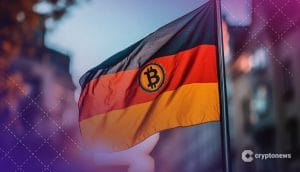Last updated:
 Why Trust Cryptonews
Why Trust Cryptonews

The Hong Kong Monetary Authority (HKMA) has introduced a subsidy program aimed at encouraging the issuance of tokenized bonds.
On November 28, the HKMA announced the Digital Bond Grant Scheme (DBGS), which will cover up to 50% of eligible expenses for tokenized bond issuances, with a cap of $321,184 (2.5 million Hong Kong dollars) per grant.
Each company is allowed up to two grants.
The initiative aims to promote the growth of the digital securities market and boost the adoption of tokenization in capital market transactions.
The DBGS will be open for an initial period of three years, accepting applications starting November 28.
To qualify for the half grant, the bond must be issued on a platform operated by the Central Moneymarkets Unit (CMU), issued in Hong Kong, and the issuer must maintain a significant local presence.
The full grant requires a minimum bond size of $128.5 million issued to at least five investors and listed on the Stock Exchange of Hong Kong (SEHK) or a platform licensed by Hong Kong’s financial regulator.
HKMA’s Chief Executive Eddie Yue attributed the DBGS to findings from Project Evergreen, a 2021 research initiative exploring distributed ledger technology in financial markets.
Yue acknowledged that while tokenized bonds are gaining traction, issuers still face challenges in adoption, prompting the HKMA to introduce financial incentives to accelerate uptake.
Hong Kong has already taken strides in tokenization.
In February 2023, the government issued $100 million in tokenized green bonds under its Green Bond Programme.
Globally, over $10 billion in tokenized bonds have been issued in the last decade, according to Yue.
The DBGS coincides with broader efforts by Hong Kong to solidify its position as a crypto-friendly financial hub.
Hong Kong to Exempt Hedge Funds from Tax
The Financial Times reported on November 28 that authorities are considering tax exemptions on crypto gains for hedge funds, private equity, and family offices.
This proposal, currently under consultation, also includes exemptions for private credit, overseas property, and carbon credit investments.
In a related development, Hong Kong’s largest virtual bank, ZA Bank, launched a service on November 25 allowing retail users to buy and sell Bitcoin and Ether directly using fiat currency.
In October, Hong Kong’s financial regulator granted its third license under the new crypto trading platform regime, with plans to approve more by the end of the year.
At the time, Julia Leung, Chief Executive of the Securities and Futures Commission (SFC), confirmed that HKVAX is the latest firm to receive a license to operate as a crypto exchange in Hong Kong.
Leung highlighted that 11 other platforms are currently on the SFC’s “deemed-to-be-licensed” list, which includes firms that have submitted applications under the new regime.
The SFC has conducted initial onsite inspections of these applicants and has asked them to make necessary adjustments to comply with regulatory requirements.
Leung expressed the regulator’s aim to issue more licenses in batches by year-end.

















